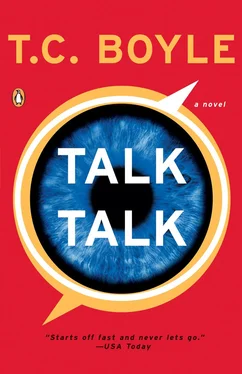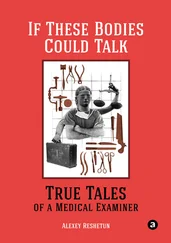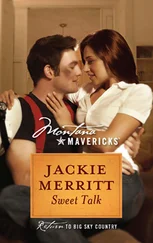“So, yes,” Milos said, in the same dense indefinable accent as Radko, waving them into the office, “you are looking for a thiff, I know, I know.”
He offered them seats-two straight-backed wooden chairs-and dropped into a swivel chair behind a desk that might once have been a library table, gouged and pitted and with nothing at all on the barren plane of its surface except for a single old-fashioned rotary phone. The rest of the decor ran to patterned wallpaper, a bookcase filled with what seemed to be birdwatchers' guides and a long unbroken line of phone books, two hundred or more, that climbed up the near wall like some sort of fortification. Dana perched briefly at the edge of her chair, but almost immediately she rose and began pacing, making liberal use of her hands as she spewed out the story, Bridger elucidating and interpreting whenever Milos' gaze seemed to grow distant. It took five minutes, no more, and then she ran out of words and sat heavily beside him. They both looked to Milos, whose face revealed nothing.
“All this I know,” he said, and held out his hands, palms up. “My cousin,” he added, in a long whistling sigh.
A protracted moment swelled and receded. It was oddly silent, as if the rest of the building were deserted, the grocery notwithstanding, and hot, too hot, the pair of windows behind Milos' desk painted shut and the fan in the corner switched off-or no longer functioning. Bridger exchanged a look with Dana-she was drained, her shoulders slumped, the drama over-and he wondered what they were even doing here. Milos, as Radko had confided, mainly worked divorces, peering through suburban windows, watching motels from across the street, and his office didn't exactly inspire confidence. He was definitely low-tech. And this thief, this man in the photo, this voice on the phone, was as high-tech as you could get.
Milos finally broke the silence. “A man such as this,” he intoned, pulling open the drawer of the desk and removing a smudged file folder, “he is not so smart as you think.” He took a moment, for dramatic emphasis, and slid the folder across the table to Dana.
Inside was the fax of a police report from the Stateline, Nevada, Police Department and there, leering at them, was the now-familiar face. The man's name was recorded as Frank Calabrese, born Peterskill, NY, 10/2/70, no address given-“Transient,” the report said, “Sex M, Race W, Age 33, Ht 6–0, Wt 180, Hair BRO, Eyes BRO, SS#? D/L 820 626 5757, State NY”-and he'd been arrested for forgery at a Good Guys store, where he'd attempted to acquire credit in another person's name-Justin Delhomme-and purchase a plasma TV worth $5,000. He was carrying a second driver's license, a California license, that showed him to be a.k.a. Dana Halter, of #31 Pacific View Court, San Roque.
Bridger could feel the excitement mounting in him-here he was, the son of a bitch, “nailed”-and he glanced up at Milos in gratitude and elation, and how could he ever have doubted him? “So his real name's what, Frank Calabrese?”
Milos tented his fingers and looked wistfully at Dana, whose head was bowed as she scanned the report, oblivious. “You are jumping,” he said, never taking his eyes from Dana. “Because this is not his name, why would it be?” He shrugged. “Just another alias.”
Sensing something in the air, Dana looked up.
“But he is not so smart, you know why?” Milos went on, pointing a finger at Dana. He let out a long breath. “Because he is in love with you.”
Dana looked to Bridger as if she hadn't read him right, then turned back to Milos. “Love?” she echoed.
“With “you”,” he repeated.
“You mean, he's in too deep-he's got too much invested in this scam or whatever it is to give it up, right?” Bridger offered.
“Who you are,” Milos said, everything freighted on his lips, “he is. You can catch him now.”
Almost involuntarily, Bridger murmured, “But how?”
The sun glazed the windows, a smear of something suspended there in a tracery of false illumination. Bridger smelled his own sweat, primordial fluid, a funk of it, and he could smell Dana too, prickling and acidic. He wanted a beer. He wanted the beach, the ocean, peace and union and love, and what he had instead was this overcooked room and Radko's cousin who was so cryptic he could have been writing fortune cookies in a factory in Chinatown. “How?” he repeated.
Milos pushed the hair out of his eyes, only to have it spring back again in a spray of glistening black vectors, and then he reached into the drawer a second time and shoved a piece of paper across the table to them. On it was written a postbox number in Mill Valley. “This,” he said, drawing it out, “is where bill goes. For cell phone. The address on this account is yours and landline number too, but bill goes here.” He was smiling now. “Very friendly man in Collections. I think you know him: Mr. Simmonds?” Another shrug. “It is a small thing.”
The clumsy lips, the imbalance of the accent: Dana wasn't reading him, so Bridger translated for her as best he could. She watched him carefully, then shifted in the chair. “But what do we do about it?” she asked, her face drawn down to nothing.
Milos' voice rode a current, higher now, as if a breeze had caught it. “You go,” he said. “You are Dana Halter too, no? You have proof?”
She nodded.
“Then that is “your” box.”
Sunday morning, early, they left San Roque in Dana's Jetta, headed north. Bridger had meant to tell Radko in person-he'd made his choice, for love, for support, for Dana-but in the end, he opted for the easy way out: e-mail. “Sorry. Gone one week. Emergency. Bridger. P. S. See you next Monday?”
The sun was behind them as they pulled out of town on the Coast Highway, the ocean gathering light and throwing it at the pavement, the car a leaping shadow just ahead of them. Dana sat in the passenger's seat beside him, her face soft and composed, her hair still wet from the shower and pinned up in a way that showed off the line of her jaw, the sharp angle of her cheekbone, her ear, whorled and perfect as a shell. She'd held him a long while that morning and then pulled back and signed “I love you,” the index finger pointing first to her heart, then both hands crossed in an embrace and finally the finger coming back to him, and he couldn't resist her. They'd made love the night before, slow and languorous, the bed a raft at sea in the dark and silence of the room, and they fell to it again, on the rug in the hall after she'd come dripping from the shower and given him the sign: “I… love… you.”
What was he feeling? Burnished. Shining. Polished like a gem. The radio was cranked and she was bent over her laptop, alternately tapping at the keys and glancing up to stare out over the stacked-up waves with pursed lips and unseeing eyes, isolated from the moment and this place and the world. The music crept into him and he tapped out the rhythm on the dash. An old song, familiar as blood. “Who, who, who, who, / Tell me who are you…”
SHE LOOKED UP from the screen and saw the sea spread out before her, the stalled distant waves like interlocking tiles, the spilled milk of the clouds, sun like wax-“metaphor, everything a metaphor”-even as the dim dripping forest of La Bassine dissolved in a blaze of light on water. Bridger was beside her, present and visible, one hand on the wheel, the other beating time on the dash. His chin bobbed, his shoulders dipped and rose. One and two, one and two. And now he was singing, singing in perfect silence, his lips pursed as if he were blowing out a whole birthday cake's worth of candles. She glanced at the LED display on the radio: 99.9, classic rock. He was singing some immemorial song he knew and she didn't, singing to himself, everything about him alive and focused and beautiful, running with the sound. She didn't stop to think what it meant to go there, to that place where the hearing were transported in the way she was when she was writing or reading or locked away in the dark chest of the cinema while the shapes joined and convulsed on the screen and she saw with a clarity so intense she had to turn away from it; no, she just let herself feel it through him, through the weave of his shoulders and the rhythmic slap of his hand, and then she was beating time too.
Читать дальше












